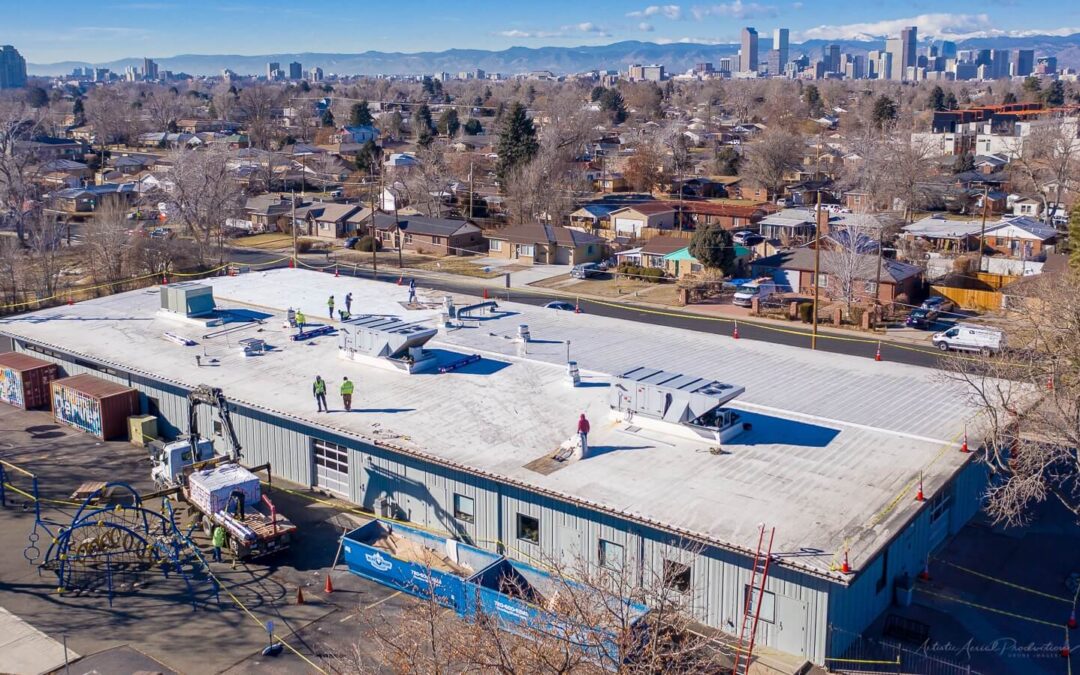Leaking ceilings, water stains, and strange odors — these are signs your commercial roof might be trying to tell you something. For property owners and facility managers, a damaged roof can mean more than just a nuisance — it can disrupt operations, impact tenants, and compromise the long-term value of your building.
So the question becomes: Can you repair the roof and get back to business, or is it time for a full roof replacement?
At Integrity Pro Roofing, we know commercial roofing problems come with high stakes. Below, we walk you through how to evaluate your roofing situation, determine the next steps, and protect your property from further damage.
What to Look for on a Commercial Roof
Routine roof inspections are critical in spotting small issues before they lead to major repairs or unplanned downtime. Whether you’re managing a retail space, warehouse, office building, or industrial facility, here are common signs your flat or metal roof may need attention:
- Ponding water or drainage issues, especially after storms
- Damaged or deteriorating flashing around rooftop units, vents, and skylights
- Cracking or blistering in roof membranes
- Rust or corrosion on metal panels or seams
- Discoloration or bubbling visible on interior ceilings or walls
- Mold or mildew growth around roof penetrations
- Visible sagging or deformation in the roof deck or surface
If you notice one or more of these issues, it may be time to bring in a commercial roofing contractor for a professional assessment.
Repair vs. Replacement: How to Decide
Not every roofing issue calls for a full replacement. In many cases, a targeted repair or protective roof coating may be all that’s needed to restore performance and prevent further damage. But when problems are widespread or structural, a complete re-roof may be the more cost-effective option in the long run.
Here are the main factors to weigh when considering repair versus replacement:
Age of the Roof
Every roofing system has a lifespan. Flat roofing membranes like TPO, EPDM, or PVC generally last 20–30 years, while flat metal roofs can last 40 years or more with proper maintenance. If your roof is nearing the end of its expected life and showing consistent issues, replacement may be the better investment.
Extent of the Damage
If the damage is isolated — such as a puncture, seam failure, or flashing deterioration, a repair may be sufficient. But if there’s widespread water intrusion, sagging, or membrane breakdown across multiple areas, replacement may be unavoidable.
Energy Efficiency Goals
A new commercial roof with reflective coatings or improved insulation can significantly reduce energy costs, especially in Denver’s high-altitude sun. If efficiency and operational cost savings are a priority, upgrading your roof might be a smart strategic move.
Budget Considerations
It’s important to compare repair costs with the potential long-term expense of recurring issues. A cheaper fix may seem appealing in the short term, but if repairs keep stacking up, a replacement can often offer better value.
When a Full Roof Replacement Is the Right Call
If you’re consistently dealing with roof leaks, water pooling, or interior damage that’s impacting your operations, a full roof replacement may be the most cost-effective and dependable solution. Commercial roof replacements offer a chance to install updated materials with better performance, energy efficiency, and warranty coverage.
While some building owners consider managing a re-roof in-house or through a general contractor, commercial roofing systems require specialized expertise. The installation process is complex, especially when it comes to roof slope, drainage systems, rooftop HVAC equipment, and city code compliance.
Partnering with a licensed commercial roofing contractor ensures proper installation and long-term performance, protecting your building and your bottom line.
Choosing the Right Commercial Roofing Contractor
Selecting a qualified roofing partner is just as important as the materials you choose. When evaluating contractors, look for:
- Proof of current licensing and insurance
- Experience with flat roofing systems and metal roof installation
- References or case studies from other commercial projects
- Local knowledge of Denver’s building codes and climate challenges
- Clear, detailed estimates and timelines
- Warranties on both labor and materials
A reputable contractor should offer more than just a quick fix — they should be a long-term partner in maintaining and protecting your investment.
Trust Integrity Pro Roofing for Your Commercial Roofing Needs
At Integrity Pro Roofing, we specialize in flat and flat metal roofing systems for commercial properties throughout the Denver metro area. Whether you need a professional inspection, targeted repair, or a full roof replacement, our experienced team is here to provide solutions that meet your building’s needs, timeline, and budget.
We bring deep expertise, honest communication, and long-lasting results to every project. If you’re ready to address a roof issue or want to schedule a preventive inspection, let’s talk.
Contact us today for a consultation or to request a commercial roof assessment.






